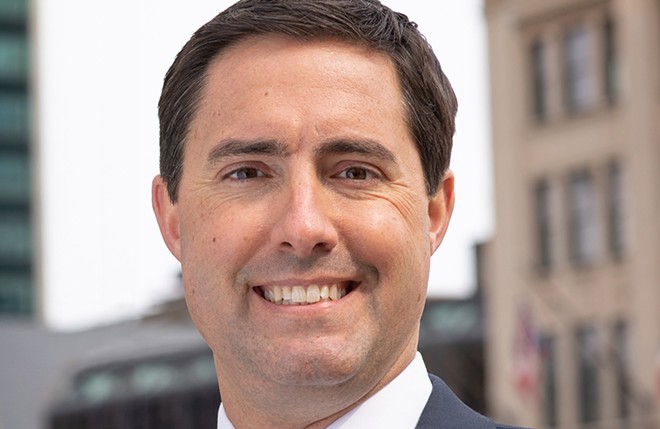Photo: Official Portrait” class=”uk-display-block uk-position-relative uk-visible-toggle”>

Photo: Official Portrait
The state’s top voting official is fighting to restrict access to the state constitution.
That same guy is actively campaigning for passage of State Issue 1, the Republican amendment to end 100 years of majority voter power in Ohio on Aug. 8. He is stumping with special interests trying to stop a majority of voters from upending right wing agendas (take your pick) to outlaw abortion, rig legislative districts, loosen gun laws, reject minimum wage increases, etc. And on Monday, LaRose announced he thinks he deserves a promotion to the U.S. Senate.
Ohio’s elections chief is leading the crusade to pass Issue 1 and impose minority rule on citizen ballot initiatives to amend the constitution. The vote of a majority of Ohio voters (the unchallenged standard in the state since 1912) would no longer be enough to enact constitutional change that reflects majority will. But a 41 % percent minority of voters would be enough to decide the fate of future constitutional amendments under the legislative initiative LaRose is championing.
The top elections official in charge of running free and fair elections in the state wants to make it nearly impossible for voters to petition their government for redress by moving the goal posts for citizen-initiated amendments to the constitution. Issue 1 would mandate a new 60% supermajority for passage instead of the simple majority margin that has stood for a century.
From his early attempts to fast-track Issue 1 through the legislature, to his notorious flip-flop on using a typically low-turnout, high-cost August election to pass a game-changing legislative amendment and his embrace of plainly prejudicial ballot language to mislead voters on Issue 1, LaRose has dropped any pretense of being a neutral referee running evenhanded elections.
The seemingly disparate response from the elections officer to accept or reject old absentee ballot request forms, depending on the group requesting them, certainly gave the impression of official bias in favor of the pro-Issue 1 crowd, argued Jewish voting rights advocate Jodie Jackson.
“Coming from an area, part of the state in the county that skews more towards the ‘Vote No’ — ‘you can’t use it’ (outdated forms). Then when it happened with the ‘Vote Yes’ — it just came across as being very hypocritical. Secretary LaRose is a leading proponent of ‘Vote Yes.’”
It is critical for Ohio voters to understand that nothing about LaRose aligning himself with an anti-abortion zealot (conspiring to keep a majority of voters from nullifying the state’s suspended abortion ban) is normal, appropriate, or ethical. The secretary of state should not be joining forces with political allies to drum up support for anything let alone an upcoming ballot issue that undermines voting rights as a means to political ends.
foutdated
We don’t let referees play for one team. We should expect no less from state election officials who are supposed to be non-aligned arbiters of fair and impartial elections. The danger of having a hyper-partisan chief election officer is obvious: It erodes essential trust in the election process.
It raises understandable voter concerns that an elections chief playing for one partisan team may create rules, interpret laws, or use administrative discretion to help his or her team win an election. Voters might well question whether an explicitly partisan administrator will handle disputed elections fairly if it involves voters who belong to a different team.
Voter confidence in the impartiality of those overseeing elections is paramount. LaRose has shaken that trust with his partiality on a Republican scheme to steal majority rule from voters. He is lobbing insults at the media for noting discrepancies in his official conduct — that rightly raise suspicions of partisan biases.
He is tweeting attacks against “liberal activist groups opposing Issue 1” that includes “hypocrite” organizations, i.e., Ohio Democrats, League of Women Voters of Ohio, Planned Parenthood of Greater Ohio, ACLU of Ohio, Ohio Education Association, and NAACP chapters throughout the state whose bylaws require more than a majority vote to amend. Not that private organization’s charter rules have anything to do with public governance — or preventing a majority of Ohio voters from having their say on what’s in their constitution.
The secretary of state should be an umpire calling strikes and balls without favor. LaRose can’t be trusted to do that as a political combatant for one side. His partisan advocacy makes him a clear and present danger to election integrity in Ohio.
This story was originally published in the Ohio Capital Journal and republished here with permission.




